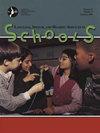Caregiver Perceptions of an Asynchronous Video-Based Training on Developmental Language Disorder: A Mixed-Methods Study.
IF 2.9
3区 医学
Q1 AUDIOLOGY & SPEECH-LANGUAGE PATHOLOGY
Language Speech and Hearing Services in Schools
Pub Date : 2025-05-21
DOI:10.1044/2025_lshss-24-00091
引用次数: 0
Abstract
PURPOSE Caregivers of children with developmental language disorder (DLD) face numerous challenges, including limited evidence-backed options for learning about oral language and DLD. This explanatory sequential, mixed-methods study quantified and described caregiver perceptions of learning about DLD through an online asynchronous training. METHOD We used quantitative methods to measure self-perceived knowledge of DLD as well as self-efficacy for supporting the child before and after participation in the training. We also measured usability and overall satisfaction with the training. We conducted 1:1 structured interviews with a subset of participants and used an inductive approach to thematic analysis to explain and expand upon quantitative results. RESULTS Caregivers reported higher knowledge and self-efficacy related to DLD after completing the training. Usability and satisfaction ratings were high. Qualitative data provided nuanced explanation of quantitative findings, indicating that the training can increase caregiver knowledge and self-efficacy and can positively impact interactions, support, and understanding of the child. We also found that while caregivers find learning about DLD helpful, they also seek additional information and support related to their own child. CONCLUSION Online asynchronous learning is a useful, satisfactory means by which to disseminate information about DLD to caregivers.照顾者对发展性语言障碍异步视频培训的看法:一项混合方法研究。
目的:发育性语言障碍(DLD)儿童的提供者面临着许多挑战,包括学习口语和DLD的证据支持的选择有限。这项解释性顺序、混合方法研究量化并描述了护理人员通过在线异步培训学习DLD的看法。方法采用定量方法对参与培训前后儿童的自我认知知识和支持自我效能感进行测评。我们还测量了培训的可用性和总体满意度。我们对一部分参与者进行了1:1的结构化访谈,并使用归纳方法进行主题分析,以解释和扩展定量结果。结果完成培训后,参与者对DLD相关知识的了解程度和自我效能感均有所提高。可用性和满意度评级很高。定性数据为定量结果提供了细致入微的解释,表明培训可以增加照顾者的知识和自我效能感,并对儿童的互动、支持和理解产生积极影响。我们还发现,虽然护理人员发现学习DLD很有帮助,但他们也会寻求与自己孩子有关的额外信息和支持。结论在线异步学习是一种有效的、令人满意的向护理人员传播DLD信息的手段。
本文章由计算机程序翻译,如有差异,请以英文原文为准。
求助全文
约1分钟内获得全文
求助全文
来源期刊

Language Speech and Hearing Services in Schools
Social Sciences-Linguistics and Language
CiteScore
4.40
自引率
12.50%
发文量
165
期刊介绍:
Mission: LSHSS publishes peer-reviewed research and other scholarly articles pertaining to the practice of audiology and speech-language pathology in the schools, focusing on children and adolescents. The journal is an international outlet for clinical research and is designed to promote development and analysis of approaches concerning the delivery of services to the school-aged population. LSHSS seeks to advance evidence-based practice by disseminating the results of new studies as well as providing a forum for critical reviews and meta-analyses of previously published work.
Scope: The broad field of audiology and speech-language pathology as practiced in schools, including aural rehabilitation; augmentative and alternative communication; childhood apraxia of speech; classroom acoustics; cognitive impairment; craniofacial disorders; fluency disorders; hearing-assistive technology; language disorders; literacy disorders including reading, writing, and spelling; motor speech disorders; speech sound disorders; swallowing, dysphagia, and feeding disorders; voice disorders.
 求助内容:
求助内容: 应助结果提醒方式:
应助结果提醒方式:


